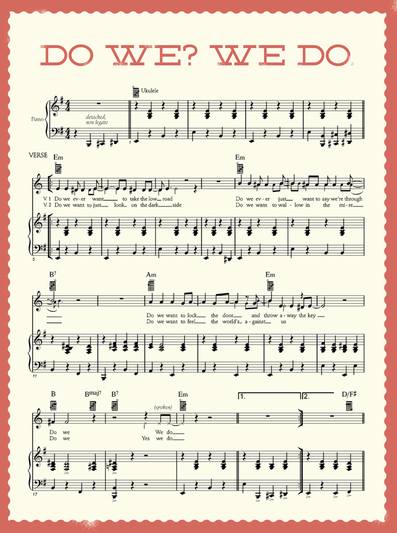Beck's new album will apparently contain no recorded music.
For those who are speed-reading: Beck's new album will apparently contain no recorded music. Yes, you read that correctly.
Here: a McSweeny's article on his forthcoming (album?) Song Reader.
I have recently been reading Plato, Aristotle, others on music - there are many indicators that the Hellenist (Greek) understanding of music would have been exceedingly important in the culture of the Palestine where Jesus was brought up, and conducted His ministry. I even believe that at one point, His own words refer indirectly to some of the issues discussed at that time regarding music, education, character, and the divine.
One of the things we have lost from the pre-Romantic understanding of music is the way that music is active with regards to the listener - that it moves the heart and mind of the listener, but this itself is also dependent upon the listener's own activity (and cultivation).
I.e., music ALWAYS implies doing something yourself. Plato and Aristotle actually thought it best to avoid as possible professional musicians - simply because this meant not making the music one's self.
In modern times, we essentially have a problem of a market of extraordinarily lazy music listeners who lack the imaginative powers to put together (synthesize) interesting musical developments in their minds. As Bernstein said, we all hear much too much music, and listen to very little music. This cultivates a habit of non-active listening.
What Beck has done here is very much like turning us back to Plato and Aristotle when we consider our relationship to music.
BRAVO! This is not only a musical mind - it is a profoundly deep mind in the consideration of how we relate ourselves to music, and how music effects us over time - even over multiple generations.
Up until sometime in the middle ages - the word "musician" was not even applied to singers and instrumentalists - it was applied exclusively to thinkers who could imaginatively grasp what music was doing - like Boethius.
So Beck here is being a musician in a very profound sense.
I found this link thanks to Eric Whitacre - a composer who himself is very much a musical mind in the older sense, with his Virtual Choir (and who has done such incredible things as setting Paradise Lost to music).
If Western culture is to re-gain an ability to listen to music, we probably first need to do something like this - very simply, more people making music, and less people hearing music in the background. And after a while, with an audience that's more capable of listening to interesting music (instead of music that's mostly intended to be a kind of background or sound-track), it might again become possible for truly fantastic music to find an audience that's more than a tiny, highly select group of individuals. As Aristotle put it - good musical education is so important, it's something that should belong to everyone.
All have seen
All the ends of the earth
have seen the salvation of our God:
sing joyfully to God, all the earth. – Psalm 98:3
have seen the salvation of our God:
sing joyfully to God, all the earth. – Psalm 98:3
Thursday, August 9, 2012
Thursday, May 10, 2012
Occupy and the Unasked Question: Conspicuous Consumption
 |
| Thornstein Veblen |
"We ought to ask of economics the same question of that we ask with regards to any other moral issue: how it fosters or frustrates human flourishing."
It is true that the Occupy movement is difficult to deal with - given that its critique of society seems so vapid and monolithic - and reverberations in the press don't seem to be generating anything deeper, either.
Nonetheless - it is a good thing to examine our economic and political system, with the aim of arriving at more poignant questions, new avenues for dialogue, and uncovering our blindness to issues that don't usually grab our attention.
And the three authors of this First Things blog post do a great job at summarizing the social ills that accompany a high degree of economic inequality between classes.
I suppose though that it is also worth asking: "Is a society based on liberal capitalism which has embraced conspicuous consumption as an ideal to the degree that America has, not predisposed toward fostering such economic inequality?" This is a question of rather serious magnitude and would take a great deal of thought, research, and unpacking. But let us first consider one element of this question - that of conspicuous consumption.
My own "take" here is more or less this: that conspicuous consumption is the greatest enemy, greater than the economic inequality itself. In nearly all societies, power has been held by a few - whether they be aristocracy, elected officials, or the wealthy. But we rightly expect this power to be exercised wisely and justly. We have been aware since ancient times that mob rule is one of the very most painful and unjust forms of government.
When the wealthy invest their wealth in the creation of jobs - e.g., in farms, factories, shops, corporations, stocks ... they are investing wisely and justly, and re-distributing wealth in a productive manner for the public good.
When they invest their wealth in ridiculously large houses, insanely expensive sports cars, boats, fashion accoutrements etc. etc., though there is some initial employment, the house or sports car is economically speaking a "dead end" - it does not further employment or the public good.
What is particularly ugly are the social effects - envy and jealousy, social stratification which has little to do with merit or talent, and widescale loss of trust in employers and governments for the portion of work which does not go toward feeding, housing, and educating, but is rather tied up in such an economic dead end with its toxic effects on society.
Subscribe to:
Posts (Atom)
